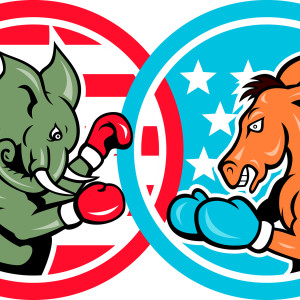Facebook co-founder Chris Hughes recently made the argument in the New York Times for the break up of the social media giant by arguing it has become a dangerous monopoly that places too much power and influence in the hands of one company and one person (his former Harvard roommate, Mark Zuckerberg).
While the column was an interesting insight into the influential power and online stranglehold Facebook wields over social media, what struck me most was the corollary between Facebook’s social media dominance and that of the anti-competitive two-party monopoly’s vice grip on American politics.
Hughes may be right that it’s time to break up the Facebook monopoly (though there’s not an easy path to do so). And I’m quite sure it’s past time to break up our country’s two-party monopoly (which will also be hard — but well worth the effort.)
In his column, Hughes wrote: “America was built on the idea that power should not be concentrated in any one person (or company), because we are all fallible. That’s why the founders created a system of checks and balances. They didn’t need to foresee the rise of Facebook to understand the threat that gargantuan companies would pose to democracy. Jefferson and Madison were voracious readers of Adam Smith, who believed that monopolies prevent the competition that spurs innovation and leads to economic growth.”
Clearly, we have an obligation to prevent monopolies in critical industries and the nation’s resource providers.
So why aren’t we more outraged by the political monopoly that utterly dominates our elections, suppresses competition and systematically stomps out common-sense electoral reforms that would pave the way for better elected leadership?
Sadly, the electorate has been largely anesthetized to political dysfunction assuming that the system we have is the best we can do. That’s exactly what partisan leaders want us to believe. They have no interest nor incentive to either change the way elections work nor in actually solving the existential public policy challenges we face. In fact, major party elected leaders have significant disincentives to reaching common-ground solutions as their rabid “base” voters threaten to withhold financial support, recruit primary challengers or go on their favorite partisan TV network to clamp down on apostates who don’t toe the party line.
But wait, you say, there are two parties … aren’t they in competition with each other?
Not so much.
The two dominant political parties may not agree on solutions to hot-button policy disagreements. But they’re in complete cahoots when it comes to blocking more competition from entering the political system. From ballot access and campaign finance restrictions to gerrymandered districts, the system is littered with anti-competitive rules that protect the two-party monopoly instead of encouraging the emergence of new voices and choices that will demand real progress on fixing problems.
And without that competition there is little incentive for the parties to change their behavior.
So until we inject more competition into the system and demand that candidates and parties actively compete for voters’ support, we won’t see progress on the big problems facing America — just more finger pointing and gamesmanship for partisan re-election advantage. There’s no incentive to do otherwise.
So how to get more competition into the political system?
First, we need to mind shift the electorate’s perception that elections should be about serving the interests of individual voters and not the political parties. That means implementing common sense reforms like nonpartisan redistricting, ballot and debate access so voters hear from more voices in elections, open primaries so all voters can participate in primary elections, ranked choice voting and other electoral advances that encourage more than just the two parties to credibly compete in general elections and much more. There are several prominent national organizations making great headway on putting game-changing electoral reforms in front of legislatures and on state ballots this year.
But electoral reforms aren’t enough on their own. The system demands we build a viable national party of influence that can directly challenge the two-party monopoly and will force greater competition into the political marketplace. This new party will be driven by a fundamentally different approach to leadership based not on the one-dimensional, left-right, conservative-liberal spectrum the parties use to pigeonhole voters. Instead, this new party will focus on problem-solving leadership with accountability, transparency, accessibility, collaboration and voter engagement as its highest values.
Because here’s the truth that the parties don’t want voters to realize: Americans agree much more on solutions to the big problems than we disagree.
But the stale two-party monopoly won’t let us get to collaborative solutions because there is no incentive for either side to collaborate or compromise.
And that’s where SAM comes in: To be that competitive incentive to demand action on the nation’s pressing policy challenges.
Building a new national party of national influence isn’t easy. And we’ll have a lot more to share as we develop our new way of leadership and how to message it to voters. But the need to challenge the two-party monopoly has never been greater. We hope you’ll join SAM in figuring out how to best break it up.

